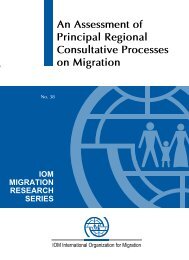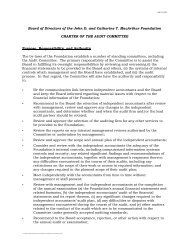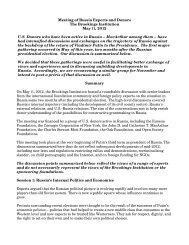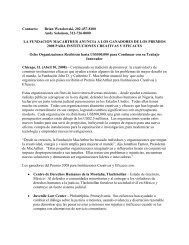A Global Compact on Learning - Brookings Institution
A Global Compact on Learning - Brookings Institution
A Global Compact on Learning - Brookings Institution
You also want an ePaper? Increase the reach of your titles
YUMPU automatically turns print PDFs into web optimized ePapers that Google loves.
212<br />
Shell communicati<strong>on</strong>, March 10, 2011.<br />
213<br />
Associati<strong>on</strong> for the Development of Educati<strong>on</strong> in Africa, “Transiti<strong>on</strong> to Post-Primary Educati<strong>on</strong>.”<br />
214<br />
MasterCard Foundati<strong>on</strong>, Youth <strong>Learning</strong> Program Strategy (Tor<strong>on</strong>to: MasterCard Foundati<strong>on</strong>, 2009).<br />
215<br />
World Bank, World Development Report 2007.<br />
216<br />
Lloyd, “Gender and Educati<strong>on</strong>.”<br />
217<br />
Lloyd and Young, New Less<strong>on</strong>s.<br />
218<br />
UNESCO, EFA <str<strong>on</strong>g>Global</str<strong>on</strong>g> M<strong>on</strong>itoring Report 2011; C. Beggs, Report to MacArthur Foundati<strong>on</strong>.<br />
219<br />
Shahidur R. Khandker, Educati<strong>on</strong> Achievements and School Efficiency in Rural Bangladesh (Washingt<strong>on</strong>: World Bank, 1996); Lloyd and Young,<br />
New Less<strong>on</strong>s.<br />
220<br />
Mohammad N. Asadullah, Nazmul Chaudhury, and Amit Dar, Student Achievement C<strong>on</strong>diti<strong>on</strong>ed up<strong>on</strong> School Selecti<strong>on</strong>: Religious and Secular<br />
Sec<strong>on</strong>dary School Quality in Bangladesh, Queen Elizabeth House Working Paper 140 (Oxford: University of Oxford, 2006); Lloyd and Young, New<br />
Less<strong>on</strong>s.<br />
221<br />
Michaelowa, “Primary Educati<strong>on</strong> Quality”; Lloyd and Young, New Less<strong>on</strong>s.<br />
222<br />
Lloyd, Mensch, and Clark, The Effects of Primary School Quality.<br />
223<br />
Plan Internati<strong>on</strong>al. Because I Am a Girl: The State of the World’s Girls (Bright<strong>on</strong>: Plan Internati<strong>on</strong>al, 2007).<br />
224<br />
Herz and Sperling, What Works.<br />
225<br />
Associati<strong>on</strong> for the Development of Educati<strong>on</strong> in Africa, “Transiti<strong>on</strong> to Post-Primary Educati<strong>on</strong>.”<br />
226<br />
FAWE communicati<strong>on</strong>, March 18, 2011.<br />
227<br />
Organizati<strong>on</strong> for Ec<strong>on</strong>omic Cooperati<strong>on</strong> and Development, Less<strong>on</strong>s from PISA for the United States: Str<strong>on</strong>g Performers and Successful Reformers in<br />
Educati<strong>on</strong> (Paris: Organizati<strong>on</strong> for Ec<strong>on</strong>omic Cooperati<strong>on</strong> and Development, 2011), http://dx.doi.org/10.1787/9789264096660-en.<br />
228<br />
Brown, Educati<strong>on</strong> for All.<br />
229<br />
S. Bartlett, Dirha Suchana: A summary of final research results. Bangladesh: Unpublished report for Save the Children US, 2005; Aga Khan Foundati<strong>on</strong>,<br />
Improving <strong>Learning</strong> Achievement.<br />
230<br />
Kirk, Building Back Better.<br />
231<br />
Lloyd and Young, New Less<strong>on</strong>s.<br />
232<br />
Research suggests that salary al<strong>on</strong>e, however, does not determine the quality of teachers. Studies have shown that salaries have more of an impact<br />
<strong>on</strong> attracting graduates to teaching but much less of an impact <strong>on</strong> retenti<strong>on</strong>; JBS Internati<strong>on</strong>al, Pathways to <strong>Learning</strong>.<br />
233<br />
P. Glewwe, N. Ilias, and M. Kremer, Teacher Incentives, NBER Working Paper 9671 (Cambridge, Mass.: Nati<strong>on</strong>al Bureau of Ec<strong>on</strong>omic Research,<br />
2003); Aga Khan Foundati<strong>on</strong>, Improving <strong>Learning</strong> Achievement; JBS Internati<strong>on</strong>al, Pathways to <strong>Learning</strong>; Uwezo, Where Do Our Children Learn?<br />
(Dar es Salaam: Uwezo, 2011).<br />
234<br />
Uwezo, Where Do Our Children Learn?<br />
235<br />
Organizati<strong>on</strong> for Ec<strong>on</strong>omic Cooperati<strong>on</strong> and Development, Less<strong>on</strong>s from PISA for the United States.<br />
236<br />
Kirk, Building Back Better.<br />
237<br />
JBS Internati<strong>on</strong>al, Pathways to <strong>Learning</strong>.<br />
238<br />
J. G. DeJaeghere, R. Williams, and R. Kyeyune, “Differences in Headteachers’ Efficacy: The Case of Uganda,” Internati<strong>on</strong>al Journal of Educati<strong>on</strong><br />
Development 29, no. 3 (2009): 312–20.<br />
239<br />
J. Westbrook et al., “Becoming a Teacher: Transiti<strong>on</strong>s from Training to the Classroom in the NWFP, Pakistan,” Internati<strong>on</strong>al Journal of Educati<strong>on</strong>al<br />
Development 29, no. 4 (2009): 437–44.<br />
240<br />
Mourshed et al., How the World’s Most Improved School Systems Keep Getting Better.<br />
241<br />
Assessment refers to <strong>on</strong>e or more methods for judging (via some type of empirical observati<strong>on</strong> or test) the actual performance of literacy or other<br />
cognitive skills; D. Wagner, Smaller, Quicker, Cheaper: Alternative Strategies for Literacy Assessment in the UN Literacy Decade (Philadelphia: University<br />
of Pennsylvania, 2003).<br />
242<br />
L. Darling-Hamm<strong>on</strong>d and L. Wentworth, “Benchmarking <strong>Learning</strong> Systems: Student Performance Assessment in Internati<strong>on</strong>al C<strong>on</strong>text,” (Stanford:<br />
Center for Opportunity Policy in Educati<strong>on</strong>, 2010).<br />
243<br />
M. Clarke, Framework for Building an Effective Assessment System: READS/MAPS Discussi<strong>on</strong> Paper (Washingt<strong>on</strong>: World Bank, 2011).<br />
244<br />
Wagner, Smaller, Quicker, Cheaper.<br />
245<br />
JBS Internati<strong>on</strong>al, Pathways to <strong>Learning</strong>.<br />
246<br />
Banerji communicati<strong>on</strong>, March 30, 2011.<br />
247<br />
UNESCO, EFA <str<strong>on</strong>g>Global</str<strong>on</strong>g> M<strong>on</strong>itoring Report 2010.<br />
248<br />
P. Black and D. William, “Assessment and Classroom <strong>Learning</strong>,” Assessment in Educati<strong>on</strong>: Principles, Policy and Practice 5, no. 1 (1998): 7–73.<br />
249<br />
Wireless Generati<strong>on</strong>, accessed April 19, 2011.<br />
A <str<strong>on</strong>g>Global</str<strong>on</strong>g> Compa c t <strong>on</strong> <strong>Learning</strong>: Taking Acti<strong>on</strong> <strong>on</strong> Educat i o n in Developing Countries<br />
C e n t e r for Universal Educat i o n at <strong>Brookings</strong><br />
62






